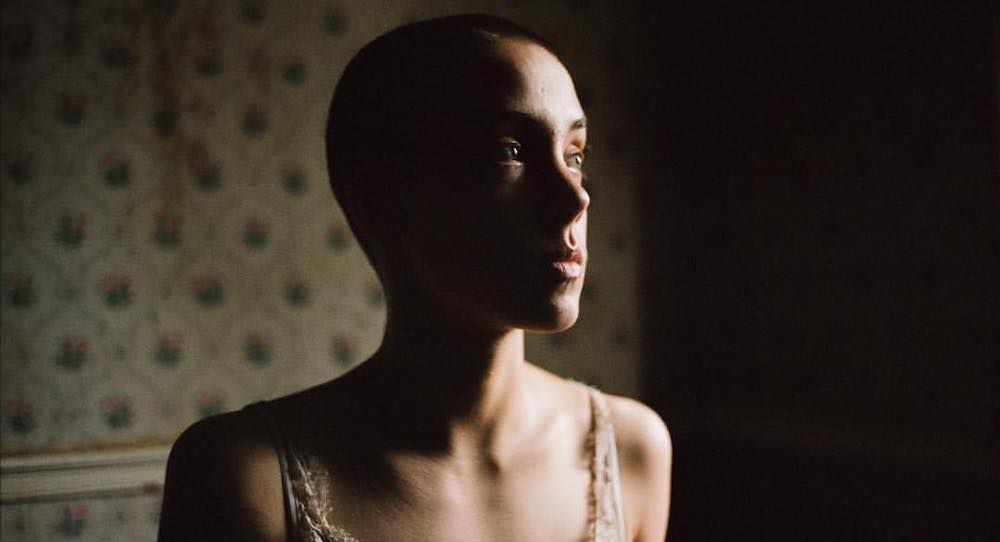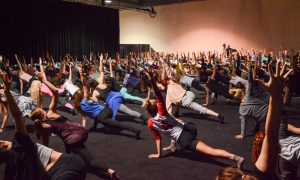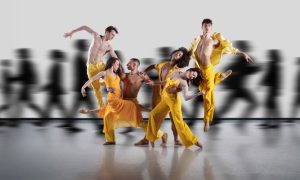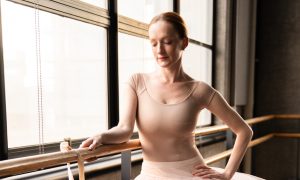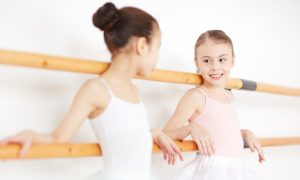Dance Informa had the opportunity to talk with Leal Zielinska, a dance artist and activist with a passion for bringing mental health issues into the light and finding ways to support dancers with the mental struggles they might face. Learn more about her and her important work below.
When did you start dancing? Can you give us a history of your life in dance?
“I grew up in Sopot, Poland, and started toddler ballet when I was about three years old. I stayed at that first dance studio until I was around 10, and then after that I danced in another studio in Poland that focused on ballet and hip hop. In my junior year of high school, I auditioned for So You Think You Can Dance and got on to the show. I turned 18 while on the show, and was the youngest and very inexperienced. The coolest part was meeting a few choreographers and older dancers who encouraged me to go to college and continue training. As the only artist in my family, that was the first time I realized, ‘Oh, this is something people actually do as a career.’
Through a series of Google searches, I found Codarts, applied and was accepted. During my freshman year, which at the time I thought was my one big chance at success in dance, I started having severe mental health issues. I became very depressed and anorexic, and had to drop out during my second semester, which was heartbreaking. I went home, quit dancing, was in and out of hospitals and facilities, trying different therapists and treatments for two years. I didn’t think I would dance ever again. To be honest, I wondered if I would ever make it out at certain points. With a lot of help from multiple support systems, I somehow managed to pull myself out of it.
Once I was more stable, I decided to go visit my ex-boyfriend who was attending The Ailey School in New York City. I had a roundtrip ticket to New York for a month in the summer of 2013, and I ended up staying for almost nine years. I had lost a lot of friends back home because of shame and stigma around mental health, and it felt like a good anonymous place for a fresh start. I started taking classes at Ailey and wasn’t sure if I wanted to dance again, but I ended up doing three semesters at The Ailey School. Then I met Sidra Bell, and she offered me an apprenticeship, so I worked with her for three years, one year as an apprentice and two years as a company member. I have a lot of respect and gratitude for Sidra.
In 2018, I felt like I wanted to explore what else was out there, and I was always interested in activism and how politics and art can productively blend together. I was somewhat aware of the work that the Gibney Company was doing, so I inquired and was lucky enough that they had one contract available. I auditioned and got the job with Gibney, and I danced with the company for three-and-a-half years, finishing with our show at The Joyce in November. The company that I joined was very small and grew very quickly, which was a wild ride. It was my first time working with a repertory company which was challenging in different ways. In January, I moved to London with my partner-to-be in a new immersive show. It’s a totally new chapter, and I’m really excited about it.”
What does dance mean to you? Why is it important, and how do you think it has the potential to effect social change?
“This is something that is constantly on my mind. I know what dance means to me. It’s something that I need kind of like air or water. It’s something that is necessary for me to feel complete and grounded and sane. It’s how I process information. It’s how I process emotion. It’s how I express, communicate and access parts of myself that I don’t know how to access elsewhere or don’t always feel comfortable or safe doing. For me, it’s something very organic, but it’s never really been enough for me to just dance for myself because I feel like that’s hugely selfish and there is way too much wrong with this world that I feel like I have the responsibility to at least address or question. It’s not enough to just sit back and enjoy the pleasures of movement.
I believe that the arts are a huge factor in cultural shifts. Art enables us to ask questions non-directly in potentially less invasive ways, which can sometimes be strategically more effective. My partner (who is a dancer and transdisciplinary artist) and I talk a lot about how effective things like public art can be in trying to get a message across, in getting people to think about something they might not otherwise have at the front of their mind. One power of dance in particular is that it can tell stories, even if they are nonlinear, and create shared experiences which promote empathy and foster a wider space for holding each other.
It’s a very strange world we live in, and there’s a whole lot wrong with it. I go back and forth nonstop all the time. I almost quit dance altogether last fall to go back to school to study sociology and psychology. It’s hard for me sometimes to justify being a dancer in the world we live in currently, but I also think that there’s something extremely powerful in using your absolute utmost strengths that you’ve been training in for years to ask questions, to provoke thoughts, to comment, and to share perspectives.”
How did you get the idea to start Okay, Let’s Unpack This? What’s the organization’s mission?
“When I joined Gibney, it was required that all dancers also create an advocacy fellowship. Because of my life experiences, my fellowship was very obviously going to be around mental health, and that’s where Okay, Let’s Unpack This was born. I thought about what was lacking in my own experience, and that informed what I wanted to offer. The idea started small with just having conversations about what the community needed, but it grew out of proportion, and I’m very grateful and humbled by how much it has developed in the last three years.
The mission of the organization is to create enough resources and awareness in the dance field that organizations like that Okay, Let’s Unpack This don’t need to exist anymore. To create an environment where it is no longer necessary, where dancers across the country have access to adequate, culturally competent, affordable (or preferably free) mental health care. To produce a genuine shift in the culture of companies and educational institutions.
With our generation, the conversation around therapy and mental health is way more open than it used to be. I think that’s insanely helpful, and some of the hardest parts for me about having gone through severe periods of mental health issues was the isolating factor in feeling like there was something wrong with me and like I was the only one who was experiencing these difficulties. I felt like a failure for not being strong enough, and there is a lot of reinforcement of those kinds of thoughts in the dance world.
It’s time to heal the culture in the dance community by normalizing conversations, creating safer spaces and holding people accountable to holding those safer spaces. One way to do this is through education. We do CPR and sexual harassment trainings all the time. Why not hold a mental health first aid training at your institution? Better yet, do it next week. There should be access to therapy for anyone who wants it that is catered to that individual. The dance community is diverse; there are a lot of queer people, people of color, immigrants, artists on Visas, artist with disabilities, etc., and all this needs to be factored in so that people are offered resources that are actually helpful to them rather than further harming or traumatizing.”
What are some of Okay, Let’s Unpack This’s offerings? Are there any challenges or success stories you can share?
“It’s hard to comment on challenges and success stories because everything is hyper-confidential. Most of the time, I feel like I am just behind my computer sending emails, making sure that everything is running smoothly. I rarely actually interact with people utilizing our services, so I just trust that everything is working fine and our data shows that everything is working great. Every now and then, someone will stop me and say, ‘Hey, I really appreciate Okay, Let’s Unpack This. I used this or that service, and it was awesome.’ But I don’t really expect that. It’s more that I know that these services are absolutely necessary, so I trust that offering them is working.
We offer both one-on-one therapy and biannual support groups, and everything is free of cost. The one-on-one therapy is on a first come, first served basis, and all our therapists are booked up right now because there is such a shortage. The support groups run for eight weeks once a week, have 10-12 people in them and are facilitated by a rotating group of facilitators.
Pre-pandemic, we also had in-person gatherings with story sharing and facilitators moderating. We did a pro-bono offering at one point when the pandemic started in March of 2020, which was really incredible because 25 therapists and private practices offered their services for free. Many of the therapists were former dancers or parents who had kids in dance and understood how much this was needed since the pandemic made the dance community even more unstable. We also offered for about a year therapy for our staff at the beginning of the pandemic. There have been a few social media campaigns dedicated to getting the word out, saying, ‘It’s okay to talk about this stuff.’ I had a big partnership with DIY Dancer Magazine, which ended up being an audio zine dedicated to mental health, which came out in June of 2021 (also on Spotify). Before the pandemic hit, we held free mental health first aid trainings in which we trained around 60-70 people.”
What’s next for the organization?
“Because we live in a nonprofit world, unfortunately a lot of what’s next for us depends on funding. The biggest influx of funding came at the beginning of the pandemic when mental health awareness was at its peak that I’ve ever seen in my lifetime. Right now, we are working on just maintaining our current offerings and not trying to grow. It’s been cool to track the data and see what resources are the most utilized in order to make the program more efficient and really prioritize the highest needs. The project already made a pretty big mark, and it’s up in the air whether it’ll continue in this current form or keep evolving, but we are officially good and budgeted through the end of the fiscal year.”
When you envision the dance world, say 10 or even 20 years from now, what do you hope to see?
“I’m honestly hopeful. I work with younger people sometimes, mostly teaching, and they are incredible. They’re so smart and so talented and so much better equipped and informed about their rights, needs and well-being than I was at their age. This is endlessly collective work; I’ve learned so much from people around me and am working to pass along what I can to younger dancers. I think if there’s an Okay, Let’s Unpack This in 2035, it will be a much more refined, better version of what it is today. Maybe such a drastic shift won’t happen in 10 years, but maybe it will and the organization won’t even be necessary anymore. In any case, I know it will happen. I see the change and certain things, if they don’t change, will just not make it through in this current world.”
To learn more about Okay, Let’s Unpack This, visit www.okayokayokay.org.
By Charly Santagado of Dance Informa.


